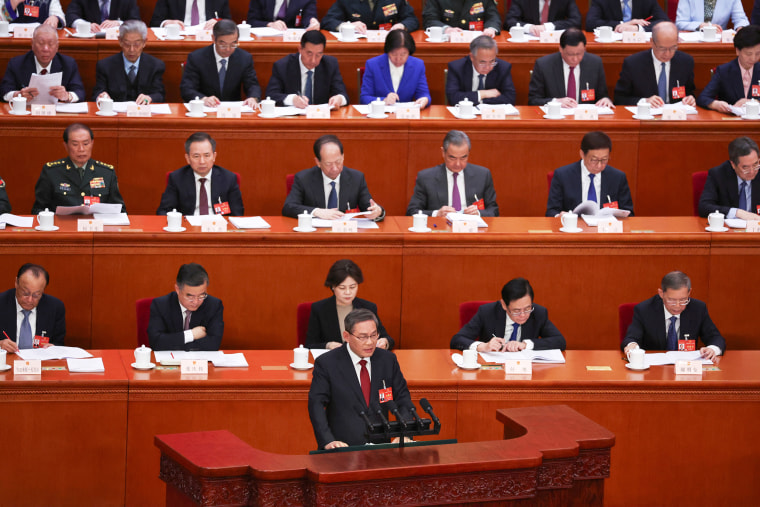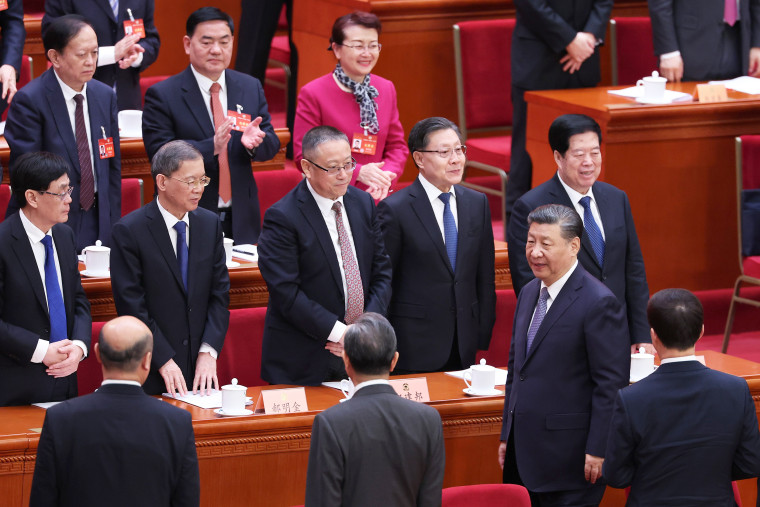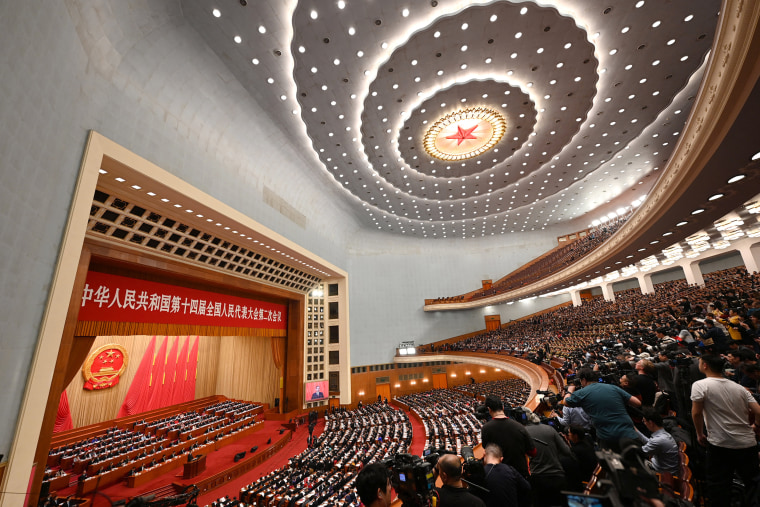A new foreign minister?
Heading into this NPC, there has been a lot of speculation about China’s next foreign minister. The country has been without one since Qin Gang was abruptly fired last year, setting off a wave of rumors about a man once regarded as part of Xi’s inner circle.
Currently, Wang Yi holds down the position in addition to his job as the country’s chief diplomat. Judging by comments officials made yesterday, it is unlikely that a new foreign minister will be announced by the end of this year’s session (or any time in the near future, it seems).
The front-runner is still widely believed to be Liu Jianchao, who started his career as a translator in 1987 and has worked his way up through the foreign ministry ranks, including as China’s ambassador to Indonesia and the Philippines. Already, Liu has been doing some diplomatic globetrotting even if he hasn’t been anointed yet.
Qin’s “resignation” as a delegate to this year’s National People’s Congress was accepted last week, though he has not been seen in public since June. Wang will conduct the traditional foreign minister’s news conference this week.
On people’s minds in China: Jobs and support for families
As China struggles with high unemployment and other economic issues, job-related proposals at this year’s legislative sessions are drawing special attention on Chinese social media.
One delegate to the Chinese People’s Political Consultative Conference, a top advisory body, is urging officials to address the perception that companies are reluctant to hire people 35 and older, a phenomenon referred to in China as “the curse of 35.” A topic about the delegate’s proposal has garnered more than 63 million views on Weibo, a popular Chinese social media platform.
Another topic touching on the intense competition for jobs among university graduates drew more than 22 million views.
The country’s record low birthrate also propelled several proposals about increasing parental support and easing pressure for families with children, but it met with tepid reaction on social media, with one comment reading, “It’s a bit late now.” Another user wrote, “The future is uncertain, I don’t want to pressure myself so much.”
No change in policy on Hong Kong and Taiwan
Regarding the politically sensitive issues of Taiwan and Hong Kong, Li did not signal much of a shift in China’s policy. Li said the Chinese territory of Hong Kong will remain committed to “law-based governance” administered by “patriots” (in other words, officials loyal to Beijing).
On Taiwan, a self-ruling island democracy that Beijing claims as its territory, Li repeated China’s official stance on “reunification” (it will happen), “separatist activities” (China is opposed) and “external interference” (that’s a standard reference to U.S. support for Taiwan, including arms sales).
It was at the 2020 meeting of the National People’s Congress that China announced the sweeping Hong Kong national security law with no warning. The law was adopted within a month to end democratic protests in the city, a former British colony that returned to Chinese sovereignty in 1997. The subsequent crackdown on dissent has all but wiped out Hong Kong’s democratic opposition and prompted some foreign companies to shift away from the international financial hub.
Hong Kong is now preparing to enact its own local national security law, known as Article 23, as required under the city’s mini-constitution. Critics say the legislation is likely to further undermine Hong Kong’s civil liberties, which it was guaranteed would be preserved for the first 50 years of Chinese rule.
Li wraps up government work report
Delegates are filing out of the auditorium after Li finished delivering the government work report, a bit more than an hour after he began speaking.
Among the highlights:
- China is aiming for economic growth of about 5% in 2024, in line with last year’s target, although it could be harder to reach amid economic headwinds and structural imbalances.
- Officials hope to create more than 12 million new urban jobs and keep the urban unemployment rate around 5.5%.
- The government is targeting an increase of about 3% in the consumer price index.
- China is intensifying efforts to attract foreign investment, including abolishing all market restrictions on investment in manufacturing and loosening restrictions on investment in market access restrictions in service sectors such as telecommunications and health care.
One bright spot for China’s economy: Electric vehicles
Li also talked about “keeping China’s advantage” when it comes to electric vehicles. In recent years, Chinese-made EVs have powered ahead of U.S. and other foreign competitors here — with help from heavy government subsidies — and now companies like BYD are going global.
The rapid growth and production of Chinese EVs poses a worry for U.S. regulators, however. The Commerce Department recently announced an investigation into the software that powers Chinese-made electric vehicles over concerns that China could collect data on U.S. motorists.
An effort to boost consumption
Li says China will launch a yearlong program to increase consumption. Boosting domestic demand is crucial for China’s effort to shift its economy away from the real estate sector, which is mired in crisis and makes up a third or more of GDP.
Li acknowledges ‘difficulties and challenges’
Li said China’s economy was on an upward trajectory, with its 5.2% growth rate one of the highest among the world’s major economies. But he also said the government was “keenly aware of the difficulties and challenges we face.”

“The complexity, severity and uncertainty of the external environment are increasing,” he said. “The foundation for the sustained and positive recovery of the country’s economy is not yet solid, with insufficient effective demand and weak social expectations.”
“We must face these problems and challenges directly,” he said.
China aims for 5% growth in 2024
A focus on economic stimulus
One thing observers around the world will be watching is what measures the Chinese government will announce to support the economy, which is experiencing a slowdown. Foreign investors and others have called for fiscal stimulus to boost an economy weighed down by a real estate crisis, high unemployment, deflation, sluggish consumption and a decline in exports and foreign investment amid geopolitical tensions.
National People’s Congress begins

Xi led top Chinese officials on stage at the Great Hall of the People, kicking off the opening session of the National People’s Congress. Li, China’s No. 2 official, is now delivering the government’s work report, his first since becoming premier last year. It is expected to include the economic growth target for 2024, among other things.
A wet winter morning
One thing Beijing residents can usually count on during the Two Sessions is clear skies — social media users even have a term for it, “liang hui blue.” It’s often been speculated that Chinese officials go to great lengths to ensure the best possible weather, including by ordering factories outside Beijing to shut down before and during the political event.
This year, however, weather conditions may have been too unfavorable to influence: The city woke up this morning to freezing temperatures, gray skies and wet snow.
Tight security around Tiananmen Square
The Great Hall of the People sits at the western edge of Tiananmen Square, where security is always tight. During big political sessions like the National People’s Congress it goes into overdrive, with thousands of police officers, soldiers and specialized security, like canine units. Typically the square is searched and scoured before anyone is allowed to enter it — including a thorough sniffing of the flower beds.
In surprise move, Chinese premier won’t face reporters
On the eve of the opening of the National People’s Congress, Chinese officials made a surprise announcement: Premier Li Qiang, China’s No. 2 official after Xi, will not hold a news conference at the end of this year’s legislative session -— or at any of them during his term, which runs until 2028. It marks the end of a 30-year tradition.
For decades, the premier’s televised news conference was one of the few chances for anyone — including journalists like me who are based here — to see the country’s No. 2 official providing insight into Chinese Communist Party thinking and publicly discussing China’s affairs.
Scrapping it is another reversal of the reforms and the “opening up” that began here in the late 1970s, and it makes an opaque political system even more of a black box. It will be harder for foreign policymakers and businesses to get clear signals from China’s leadership about plans.
It is also likely to frustrate investors that at a time when China’s economy is losing steam, the country’s top economic official won’t be talking about it.
Inside the Great Hall of the People
I have covered Chinese political events and meetings inside the Great Hall of the People since Xi first came to power in 2012. I admit — to me, being inside the building always feels a bit like being on a massive 1.85 million-square-foot movie set.

The Great Hall of the People opened in September 1959, and in many ways the decor hasn’t really changed. There are towering marble pillars, thick red carpets and curtained hallways, as well as sprawling paintings of Chinese scenery. Security protocols have certainly evolved over the years, with facial recognition machines that “read” your ID card and airport-style scanners in the lobby.
The focal point is the cavernous “Auditorium of Ten Thousand People.” It’s where decades of Communist Party pomp and pageantry have played out under a huge red star on the ceiling adorned with lights. Up to 500 of the highest-ranking party members can sit on the raised dais. During big political events, everything inside the auditorium is tightly choreographed, including the way tea is served to officials.
There is a maze of other reception halls and conference rooms. For all your big dinner needs, the State Banquet Hall can host 5,000 people, as it did during Richard Nixon’s historic 1972 visit to China.
What are the ‘Two Sessions’?
The most prominent political event of the year in China is known as liang hui, or the “Two Sessions.” The annual meetings of the ruling Chinese Communist Party are typically held in March (except in 2020, when they were delayed until May by the pandemic) at the Great Hall of the People near Tiananmen Square.
The main event is the National People’s Congress, where the Chinese premier delivers a speech (called the “work report”) that lays out the government’s plans and agenda for the year. There is also a “consultative session” the day before, though decisions have been largely predetermined. Chinese President Xi Jinping chairs both sessions but does not give an address at either of them.
About 3,000 delegates come to Beijing from across China — many of them attend the sessions wearing traditional dress or military uniforms. This year’s NPC is likely to wind down on March 11 with internal votes on reports and a closing ceremony.

